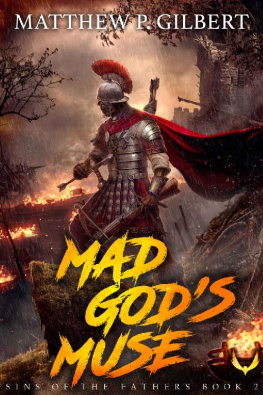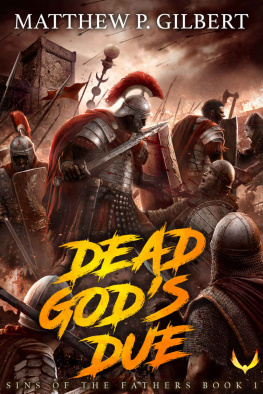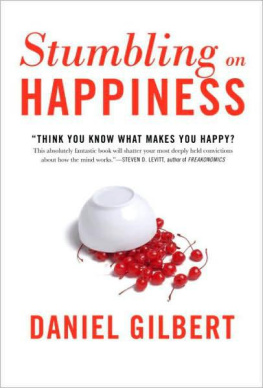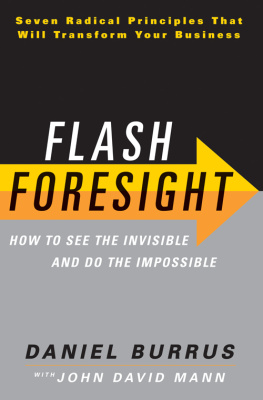ACKNOWLEDGMENTS
THIS IS THE PART OF THE BOOK in which the author typically claims that nobody writes a book by himself and then names all the people who presumably wrote the book for him. It must be nice to have friends like that. Alas, all the people who wrote this book are me, so let me instead thank those who by their gifts enabled me to write a book without them.
First and foremost, I thank the students and colleagues who did so much of the research described in these pages and let me share in the credit. They include Danny Axsom, Mike Berkovits, Stephen Blumberg, Ryan Brown, David Centerbar, Erin Driver-Linn, Liz Dunn, Jane Ebert, Mike Gill, Sarit Golub, Karim Kassam, Debbie Kermer, Boaz Keysar, Jaime Kurtz, Matt Lieberman, Jay Meyers, Carey Morewedge, Kristian Myrseth, Becca Norwick, Kevin Ochsner, Liz Pinel, Jane Risen, Todd Rogers, Ben Shenoy, and Thalia Wheatley. How did I get lucky enough to work with all of you?
I owe a very special debt of gratitude to my friend and longtime collaborator Tim Wilson of the University of Virginia, whose creativity and intelligence have been constant sources of inspiration, envy, and research grants. The previous sentence is the only one in this book that I could possibly have written without him.
Several colleagues read chapters, made suggestions, provided information or in some other way spared the wild geese a good chasing. They include Sissela Bok, Allan Brandt, Patrick Cavanagh, Nick Epley, Nancy Etcoff, Tom Gilovich, Richard Hackman, John Helliwell, Danny Kahneman, Boaz Keysar, Jay Koehler, Steve Kosslyn, David Laibson, Andrew Oswald, Steve Pinker, Rebecca Saxe, Jonathan Schooler, Nancy Segal, Dan Simons, Robert Trivers, Dan Wegner, and Tim Wilson. Thank you all.
My agent, Katinka Matson, dared me to stop yapping about this book and to start writing it, and although she isnt the only person who ever told me to stop yapping, shes the only one I still like. My editor at Knopf, Marty Asher, has a beautiful ear and a big blue pencil, and if you dont think this book is a pleasure to read, then you should have seen it before he got ahold of it.
I wrote much of this book while on sabbatical leaves that were subsidized by the President and Fellows of Harvard College, the John Simon Guggenheim Memorial Foundation, the James McKeen Cattell Foundation, the American Philosophical Society, the National Institute of Mental Health, and the University of Chicago Graduate School of Business. I thank these institutions for investing in my disappearance.
And finally, the mush. I am grateful for the coincidence of having a wife and a best friend who are both named Marilynn Oliphant. No one should have to pretend to be interested in every half-baked thought that pops into my head. No one should, but someone does. The members of the Gilbert and Oliphant clansLarry, Gloria, Sherry, Scott, Diana, Mister Mikey, Jo, Danny, Shona, Arlo, Amanda, Big Z, Sarah B., Wren, and Daylynshare joint custody of my heart, and I thank them all for giving that heart a home. Finally, allow me to remember with gratitude and affection two souls whom even heaven does not deserve: my mentor, Ned Jones, and my mother, Doris Gilbert.
Now lets go stumbling.
July 18, 2005
Cambridge, Massachusetts
AFTERWORD
My mind presageth happy gain and conquest.
Shakespeare, King Henry VI, Part III
MOST OF US MAKE at least three important decisions in our lives: where to live, what to do, and with whom to do it. We choose our towns and our neighborhoods, we choose our jobs and our hobbies, we choose our spouses and our friends. Making these decisions is such a natural part of adulthood that it is easy to forget that we are among the first human beings to make them. For most of recorded history, people lived where they were born, did what their parents had done, and associated with those who were doing the same. Millers milled, Smiths smithed, and little Smiths and little Millers married whom and when they were told. Social structures (such as religions and castes) and physical structures (such as mountains and oceans) were the great dictators that determined how, where, and with whom people would spend their lives, which left most folks with little to decide for themselves. But the agricultural, industrial, and technological revolutions changed all that, and the resulting explosion of personal liberty has created a bewildering array of options, alternatives, choices, and decisions that our ancestors never faced. For the very first time, our happiness is in our hands.
How are we to make these choices? In 1738, a Dutch polymath named Daniel Bernoulli claimed he had the answer. He suggested that the wisdom of any decision could be calculated by multiplying the probability that the decision will give us what we want by the utility of getting what we want. By utility, Bernoulli meant something like goodness or pleasure.1 The first part of Bernoullis prescription is fairly easy to follow because in most circumstances we can roughly estimate the odds that our choices will get us where we want to be. How likely is it that youll be promoted to general manager if you take the job at IBM? How likely is it that youll spend your weekends at the beach if you move to St. Petersburg? How likely is it that youll have to sell your motorcycle if you marry Eloise? Calculating such odds is relatively straightforward stuff, which is why insurance companies get rich by doing little more than estimating the likelihood that your house will burn down, your car will be stolen, and your life will end early. With a little detective work, a pencil, and a good eraser, we can usually estimateat least roughlythe probability that a choice will give us what we desire.
The problem is that we cannot easily estimate how well feel when we get it. Bernoullis brilliance lay not in his mathematics but in his psychologyin his realization that what we objectively get (wealth) is not the same as what we subjectively experience when we get it (utility). Wealth may be measured by counting dollars, but utility must be measured by counting how much goodness those dollars buy.2 Wealth doesnt matter; utility does. We dont care about money or promotions or beach vacations per se; we care about the goodness or pleasure that these forms of wealth may (or may not) induce. Wise choices are those that maximize our pleasure, not our dollars, and if we are to have any hope of choosing wisely, then we must correctly anticipate how much pleasure those dollars will buy us. Bernoulli knew that it was much easier to predict how much wealth a choice might produce than how much utility a choice might produce, so he devised a simple conversion formula that he hoped would allow anyone to translate estimates of the former into estimates of the latter. He suggested that each successive dollar provides a little less pleasure than the one before it, and that a person can therefore calculate the pleasure they will derive from a dollar simply by correcting for the number of dollars they already have.
The determination of the value of an item must not be based on its price, but rather on the utility it yields. The price of the item is dependent only on the thing itself and is equal for everyone; the utility, however, is dependent on the particular circumstances of the person making the estimate. Thus there is no doubt that a gain of one thousand ducats is more significant to a pauper than to a rich man though both gain the same amount.3
Bernoulli correctly realized that people are sensitive to relative rather than absolute magnitudes, and his formula was meant to take this basic psychological truth into account. But he also knew that translating wealth into utility was not as simple as hed made it out to be, and that there were other psychological truths that his formula ignored.
Next page






